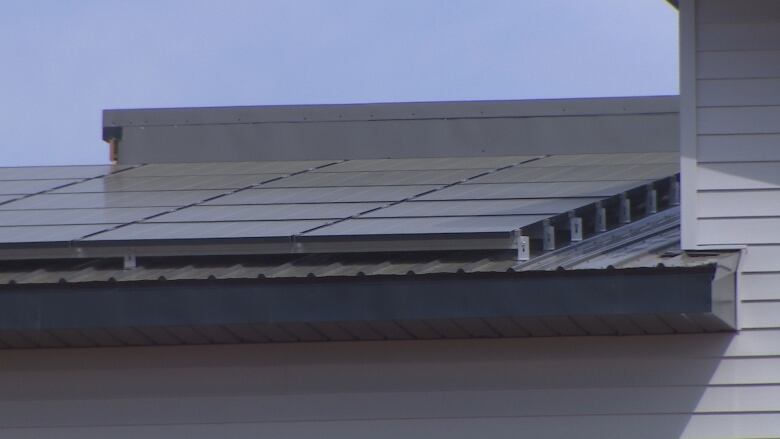'Taxing the sun that's hitting your roof': Solar energy proponent questions tax rules
Company that sells solar panels calls on feds, province to change rules

A solar energy proponent on P.E.I. says Islanders who generate their own solar electricity are getting a good deal, despite rules from the Canada Revenue Agency that lead to government "taxing the sun that's hitting your roof."
Steve Howard is president of Renewable Lifestyles, a Summerside-based company that sells and installs household solar electric systems. While he doesn't hold a seat in the provincial legislature, Howard has also been named the energy critic for the P.E.I. Green Party.
- P.E.I. man wants to know why he pays HST on electricity he generates himself
- Solar on the roof taxed as income
Most homeowners who install solar electric panels join the province's net metering program.
Under that program, they feed excess energy into the provincial grid when their panels produce more than their home is using. In exchange, they receive credits to draw electricity back out of the grid when the sun isn't shining.
'Like paying tax on food I grew myself'
Howard said the Canada Revenue Agency considers feeding that electricity into and out of the grid a financial transaction, even though, under P.E.I.'s system, net metering households never receive financial compensation for the electricity they generate.

That means homeowners have to claim the electricity they generate as income, and they're also charged HST on the electricity they draw back out of the system, even if they've earned enough credits that they don't pay for the electricity itself.
Howard said when he first installed his own solar photovoltaic (PV) system and saw his first electric bill, "this felt wrong to pay tax on power I produced like paying tax on food I grew myself."
Avoiding the tax for a time
Howard said homeowners can takes steps to avoid the tax at least for a time. By registering as a business they can claim back the HST they pay. They can also claim the cost of their solar panels against the income declared from the electricity generated.
But once the panels have paid for themselves, homeowners have to start paying income tax on the electricity they generate.
I don't agree with the idea of taxing the sun that's hitting your roof.- Steve Howard, Renewable Lifestyles
"Whenever my system has paid for itself and I've depreciated all the value of my system against the energy I've sent into the grid, I am going to end up paying income tax on sunshine that's hitting my roof," he said.
"I don't agree with the idea of taxing the sun that's hitting your roof. That's the bottom line."
P.E.I. homeowners receive no cash under net metering
Howard said the CRA's rules make more sense in jurisdictions like Ontario and Nova Scotia, where homeowners can actually receive cash payments under net metering. But under P.E.I.'s system, they can't.

Howard said he's tried to convince the CRA to change its policy, and he doesn't think that's likely to happen. So he'd at least like to see the P.E.I. government change its net metering program to allow homeowners to earn income from excess electricity they generate.
"That's maybe the easy, small change that can be made is to offer full compensation for over-production."
'I was being cheated, no other word for it'
Another homeowner who participates in net metering said he feels he's being "cheated" by the tax rules for net metering.
"My system cost $23,000.00 plus tax and I accepted that as part of the cost but I was actually shocked when I saw my first bill and realized I was being cheated, no other word for it," Paul Brown told CBC News via email.
"This makes no sense but no levels of government seem interested in actually understanding and explaining the issue and then correcting it.If we are actually serious about private investment in 'green power' which is what should be encouraged, then we have to have governments at least be 'fair' with the tax system."
The P.E.I. government recently commissioned a review of the province's electrical grid, which government says could lead to changes to the province's net metering program.
The CRA confirmed to CBC News that electricity transferred through a net metering program is considered a taxable supply and thus subject to HST/GST.
Maritime Electric says it has 157 P.E.I. customers enrolled in net metering.
- MORE P.E.I. NEWS |Province adds 27 new teaching positions for the fall
- MORE P.E.I. NEWS | P.E.I. needs 100s of construction workers immediately












_(720p).jpg)


 OFFICIAL HD MUSIC VIDEO.jpg)
.jpg)



























































































